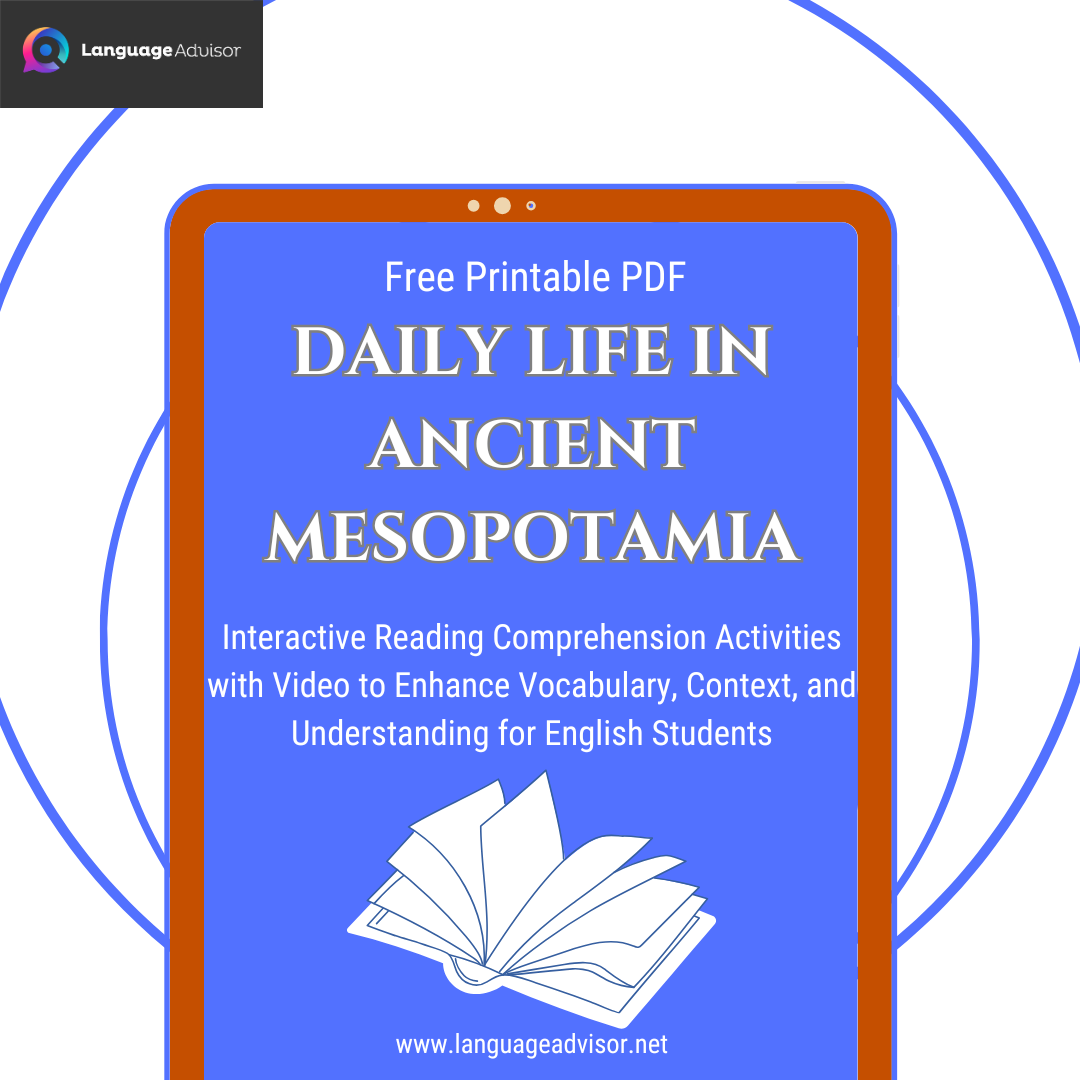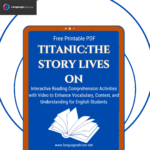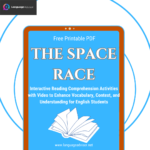Daily life in Ancient Mesopotamia. Interactive Reading Comprehension Activities with Video to Enhance Vocabulary, Context, and Understanding for English Students. Free Printable PDF
Daily life in Ancient Mesopotamia

Improving reading comprehension is a vital skill for English learners at all levels. It goes beyond just understanding the words on the page, but also involves grasping meaning, context, and intent behind a text. One effective way to enhance reading comprehension is by integrating videos alongside written exercises. Video content can provide visual cues, context, and engagement that help reinforce the learning process. In this blog post, we’ll explore a fun and interactive reading comprehension activity that combines written passages with video resources to deepen understanding and make learning more enjoyable.

Daily life in Ancient Mesopotamia – Reading Comprehension
Watch the video
With the start of the Sumerian civilization, daily life in Mesopotamia began to change. Prior to the growth of cities and large towns, people lived in small villages and most people hunted and gathered.
There wasn’t a lot of variety in jobs or daily life; with the growth of large cities, things changed. There were all sorts of jobs and activities; while many people still worked as farmers in the country, in the city, a person could grow up to work in a number of different jobs, such as priest, scribe, merchant, craftsman, soldier, civil servant or laborer with people moving to towns and governments being formed.
Society was dividing into different classes of people for perhaps the first time. At the top of society was the king and his family. The priests were considered near the top as well. The rest of the upper class was made up of the wealthy, such as high-level administrators and scribes.
Below the upper class was a small middle class made up of craftsmen, merchants, and civil servants. They could make a decent living, and could work hard to try to move up in class.
The lower class was made up of laborers and farmers. These people lived a harder life, but could still work their way up with hard work.
At the bottom were the slaves. Slaves were owned by the king, or bought and sold among the upper-class. Slaves were usually people who were captured in battle.
Most people lived in mud brick homes there were rectangular in shape and had two or three levels. The roofs were flat, and people would often sleep on the roofs during the hot summers. The mud brick worked as a good insulator to help to keep the homes a bit cooler in the summer, and warmer in the winter.
As the cities of Mesopotamia grew wealthy, there were more resources and free time for people to enjoy entertainment. They enjoyed music at festivals including drums, liars, flutes and harps. They also enjoyed sports such as boxing and wrestling, as well as board games and games of chance using dice.
The children of the time would have had toys to play with, such as tops and jump ropes. Art and poetry was a big part of the wealthier cities; most of the poetry and art had a religious theme or honored the king of the city. Storytellers would have passed stories down over generations with some of the more popular stories eventually being written down on clay tablets by scribes. Clothing was typically made from sheepskin or wool. The men wore kilt-like skirts, and the women wore longer dresses. They enjoyed wearing jewelry, especially rings. The women braided their long hair, while the men have long hair and beards. Both men and women wore makeup
Vocabulary words:
prior – adj. earlier in time; noun the head of a religious order; in an abbey the prior is next below the abbot
variety – noun a difference that is usually pleasant; (biology) a taxonomic category consisting of members of a species that differ from others of the same species in minor but heritable characteristics; noticeable heterogeneity; a category of things distinguished by some common characteristic or quality; a show consisting of a series of short unrelated performances; a collection containing a variety of sorts of things
priest – noun a clergyman in Christian churches who has the authority to perform or administer various religious rites; one of the Holy Orders; a person who performs religious duties and ceremonies in a non-Christian religion
scribe – noun informal terms for journalists; French playwright (1791-1861); a sharp-pointed awl for marking wood or metal to be cut; someone employed to make written copies of documents and manuscripts; verb score a line on with a pointed instrument, as in metalworking
merchant – noun a businessperson engaged in retail trade
craftsman – noun a skilled worker who practices some trade or handicraft; a creator of great skill in the manual arts; a professional whose work is consistently of high quality
soldier – noun a wingless sterile ant or termite having a large head and powerful jaws adapted for defending the colony; an enlisted man or woman who serves in an army; verb serve as a soldier in the military
civil – adj. of or in a condition of social order; not rude; marked by satisfactory (or especially minimal) adherence to social usages and sufficient but not noteworthy consideration for others; (of divisions of time) legally recognized in ordinary affairs of life; applying to ordinary citizens; of or relating to or befitting citizens as individuals; of or occurring within the state or between or among citizens of the state
servant – noun a person working in the service of another (especially in the household); in a subordinate position
laborer – noun someone who works with their hands; someone engaged in manual labor
government – noun the act of governing; exercising authority; (government) the system or form by which a community or other political unit is governed; the organization that is the governing authority of a political unit; the study of government of states and other political units
class – noun elegance in dress or behavior; people having the same social or economic status; a collection of things sharing a common attribute; (biology) a taxonomic group containing one or more orders; a body of students who are taught together; a body of students who graduate together; a league ranked by quality; education imparted in a series of lessons or meetings; verb arrange or order by classes or categories
wealthy – adj. having an abundant supply of money or possessions of value
administrator – noun someone who manages a government agency or department; the party appointed by a probate court to distribute the estate of someone who dies without a will or without naming an executor; someone who administers a business
living – adj. (informal) absolute; (used of minerals or stone) in its natural state and place; not mined or quarried; still in active use; true to life; lifelike; pertaining to living persons; dwelling or inhabiting; often used in combination; still in existence; noun people who are still living; the experience of being alive; the course of human events and activities; the financial means whereby one lives; the condition of living or the state of being alive
slave – adj. held in servitude; noun a person who is owned by someone; someone who works as hard as a slave; someone entirely dominated by some influence or person; verb work very hard, like a slave
capture – noun the act of forcibly dispossessing an owner of property; the removal of an opponent’s piece from the chess board; the act of taking of a person by force; any process in which an atomic or nuclear system acquires an additional particle; a process whereby a star or planet holds an object in its gravitational field; verb capture as if by hunting, snaring, or trapping; succeed in representing or expressing something intangible; attract; cause to be enamored; bring about the capture of an elementary particle or celestial body and causing it enter a new orbit; succeed in catching or seizing, especially after a chase; take possession of by force, as after an invasion
insulator – noun a material such as glass or porcelain with negligible electrical or thermal conductivity
resource – noun a source of aid or support that may be drawn upon when needed; the ability to deal resourcefully with unusual problems; available source of wealth; a new or reserve supply that can be drawn upon when needed
entertainment – noun an activity that is diverting and that holds the attention
festival – noun an organized series of acts and performances (usually in one place); a day or period of time set aside for feasting and celebration
religious – adj. having or showing belief in and reverence for a deity; concerned with sacred matters or religion or the church; extremely scrupulous and conscientious; noun a member of a religious order who is bound by vows of poverty and chastity and obedience
honor – noun a woman’s virtue or chastity; the quality of being honorable and having a good name; the state of being honored; a tangible symbol signifying approval or distinction; verb accept as pay; bestow honor or rewards upon; show respect towards
generation – noun the act of producing offspring or multiplying by such production; the production of heat or electricity; group of genetically related organisms constituting a single step in the line of descent; the normal time between successive generations; a stage of technological development or innovation; a coming into being; all the people living at the same time or of approximately the same age
popular – adj. (of music or art) new and of general appeal (especially among young people); carried on by or for the people (or citizens) at large; regarded with great favor, approval, or affection especially by the general public; representing or appealing to or adapted for the benefit of the people at large
typical – adj. conforming to a type; exhibiting the qualities or characteristics that identify a group or kind or category; of a feature that helps to distinguish a person or thing

True or false?
- After the growth of cities and large towns, people lived in small villages and most people hunted and gathered.
- Slaves were in the upper class of society.
- Only men wore makeup in Ancient Mesopotamia.
- Stories were passed down from child to parent.
- The roofs on the houses were peaked.
Fill in the blanks
| Vocabulary word | Synonym | Antonym | Definition |
| prior | after | Something that has already happened | |
| Writer | —– | Somebody who is paid to write | |
| Trader | —– | Somebody who buys and sells items. | |
| —— | —– | A section of society. | |
| Wealthy | |||
| Imprison | To catch and keep | ||
| Generation | —– | ||
| entertainment | —– | ||
| Well known and well-liked | |||
| Strange | An ordinary occurrence |
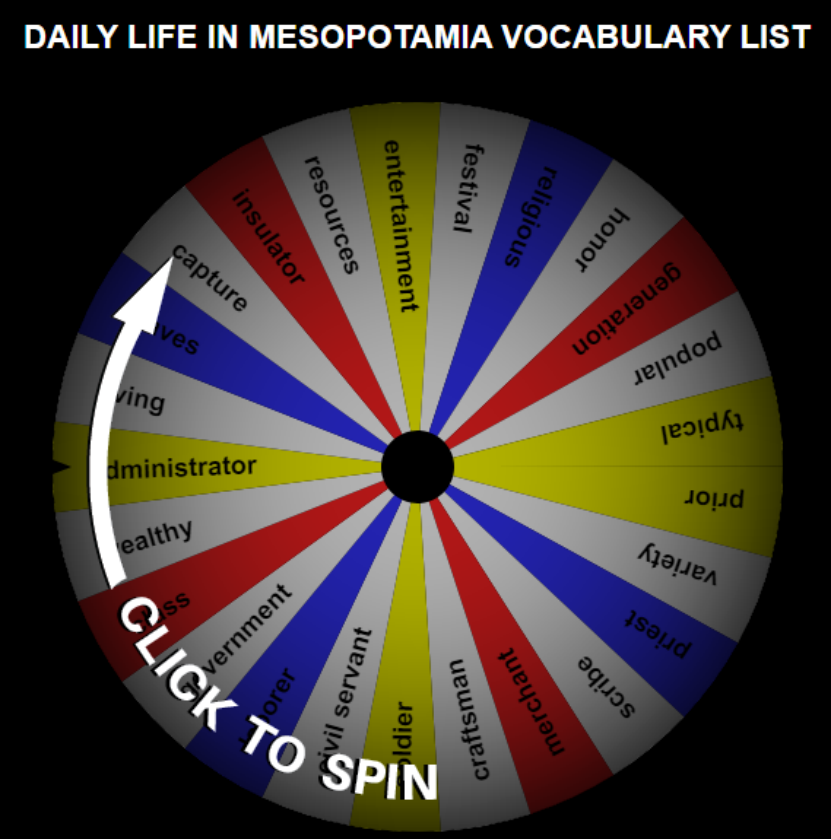
Use it in a sentence
Link: https://wheeldecide.com/index.php?id=459334
Spin the wheel and get students to say a word. The first student who is able to do so gets a point for their team.
Ancient Mesopotamia
Watch the video here:
The story of writing, astronomy, and law; the story of civilization itself begins in one place. Not Egypt, not Greece, not Rome, but Mesopotamia.
Mesopotamia is an exceedingly fertile plain situated between the Tigris and the Euphrates Rivers. For five millennia, the small strip of land situated in what is today Iraq, Kuwait and Syria fostered innovations that would change the world forever.
Inhabited for nearly 12,000 years, Mesopotamia’s stable climate, rich soil and steady supply of fresh water made it ideal for agriculture to develop and thrive. About 6,000 years ago, seemingly overnight, some of these agricultural settlements blossomed into some of the world’s first cities.
In the period between 4,000 and 3,100 BC, Mesopotamia was dotted with a constellation of competing city states. At one point, they were unified under the Akkadian Empire and then broke apart forming the empires of Assyria and Babylon.
Despite near constant warfare, innovation and development thrived in ancient Mesopotamia. They built on a monumental scale from palaces to ziggurats, mammoth temples served as ritual locations to commune with the gods. They also developed advanced mathematics, including a base 60 system that created a 60-second minute, a 60-minute hour and a 360-degree circular angle.
The Babylonians used their sophisticated system of mathematics to map and study the sky. They divided one earth year into 12 periods. Each was named after the most prominent constellations in the heavens, a tradition later adopted by the Greeks to create the zodiac. They also divided the week into seven days, naming each after their seven gods embodied by the seven observable planets in the sky.
But perhaps the most impactful innovation to come out of Mesopotamia is literacy. What began as simple pictures scrawled onto wet clay to keep track of goods and wealth developed into a sophisticated writing system by the year 3,200 BC. This writing system would come to be called cuneiform in modern times and proved so flexible that over the span of 3,000 years, it would be adapted for over a dozen different major languages and countless uses including recording the law of the Babylonian king Hammurabi, which formed the basis of a standardized justice system.
But Mesopotamia’s success became its undoing. Babylon in particular proved too rich a state to resist outside envy. In 539 BC, the Persian king Cyrus conquered Babylon and sealed his control over the entirety of Mesopotamia. For centuries, this area became a territory of foreign empires. Eventually, Mesopotamia would fade like its kings into the mists of history. And its cities would sink beneath the sands of Iraq. But its ideas would prevail in literacy, law, math, astronomy and the gift of civilization itself.
Vocabulary:
civilization – noun a society in an advanced state of social development (e.g., with complex legal and political and religious organizations); the social process whereby societies achieve civilization; the quality of excellence in thought and manners and taste; a particular society at a particular time and place
astronomy – noun the branch of physics that studies celestial bodies and the universe as a whole
law – noun the learned profession that is mastered by graduate study in a law school and that is responsible for the judicial system; a rule or body of rules of conduct inherent in human nature and essential to or binding upon human society; a generalization that describes recurring facts or events in nature; legal document setting forth rules governing a particular kind of activity; the collection of rules imposed by authority; the branch of philosophy concerned with the law and the principles that lead courts to make the decisions they do; the force of policemen and officers
fertile – adj. capable of reproducing; marked by great fruitfulness; bearing in abundance especially offspring; intellectually productive
plain – adj. lacking embellishment or ornamentation; free from any effort to soften to disguise; lacking patterns especially in color; not elaborate or elaborated; simple; not mixed with extraneous elements; lacking in physical beauty or proportion; clearly revealed to the mind or the senses or judgment; adv. unmistakably (`plain’ is often used informally for `plainly’); noun extensive tract of level open land; a basic knitting stitch; verb express complaints, discontent, displeasure, or unhappiness
millennium – noun a span of 1000 years; the 1000th anniversary (or the celebration of it); (New Testament) in Revelations it is foretold that those faithful to Jesus will reign with Jesus over the earth for a thousand years; the meaning of these words have been much debated; some denominations (e.g. Jehovah’s Witnesses) expect it to be a thousand years of justice and peace and happiness
foster – adj. providing or receiving nurture or parental care though not related by blood or legal ties; noun United States songwriter whose songs embody the sentiment of the South before the American Civil War (1826-1864); verb help develop, help grow; bring up under fosterage; of children; promote the growth of
innovation – noun the act of starting something for the first time; introducing something new; a creation (a new device or process) resulting from study and experimentation; the creation of something in the mind
Inhabited – adj. having inhabitants; lived in
stable – adj. maintaining equilibrium; not taking part readily in chemical change; firm and dependable; subject to little fluctuation; resistant to change of position or condition; showing little if any change; noun a farm building for housing horses or other livestock; verb shelter in a stable
climate – noun the weather in some location averaged over some long period of time; the prevailing psychological state
steady – adj. not easily excited or upset; securely in position; not shaky; not subject to change or variation especially in behavior; relating to a person who does something regularly; marked by firm determination or resolution; not shakable; not liable to fluctuate or especially to fall; adv. in a steady manner; noun a person loved by another person; verb make steady; support or hold steady and make steadfast, with or as if with a brace
ideal – adj. constituting or existing only in the form of an idea or mental image or conception; conforming to an ultimate standard of perfection or excellence; embodying an ideal; of or relating to the philosophical doctrine of the reality of ideas; noun the idea of something that is perfect; something that one hopes to attain; model of excellence or perfection of a kind; one having no equal
agriculture – noun the class of people engaged in growing food; the practice of cultivating the land or raising stock; a large-scale farming enterprise; the federal department that administers programs that provide services to farmers (including research and soil conservation and efforts to stabilize the farming economy); created in 1862
thrive – verb gain in wealth; grow stronger
settlement – noun something settled or resolved; the outcome of decision making; a conclusive resolution of a matter and disposition of it; an area where a group of families live together; termination of a business operation by using its assets to discharge its liabilities; the act of colonizing; the establishment of colonies; a community of people smaller than a town; a body of people who settle far from home but maintain ties with their homeland; inhabitants remain nationals of their home state but are not literally under the home state’s system of government
blossom – noun reproductive organ of angiosperm plants especially one having showy or colorful parts; the period of greatest prosperity or productivity; verb develop or come to a promising stage; produce or yield flowers
constellation – noun a configuration of stars as seen from the earth; an arrangement of parts or elements
compete – verb compete for something; engage in a contest; measure oneself against others
unify – verb become one; join or combine; to bring or combine together or with something else; act in concert or unite in a common purpose or belief; bring together for a common purpose or action or ideology or in a shared situation
constant – adj. steadfast in purpose or devotion or affection; continually recurring or continuing without interruption; uninterrupted in time and indefinitely long continuing; persistent in occurrence and unvarying in nature; noun a quantity that does not vary; a number representing a quantity assumed to have a fixed value in a specified mathematical context
monumental – adj. of outstanding significance; relating or belonging to or serving as a monument; imposing in size or bulk or solidity
ritual – adj. of or relating to or employed in social rites or rituals; of or relating to or characteristic of religious rituals; noun stereotyped behavior; any customary observance or practice; the prescribed procedure for conducting religious ceremonies
commune – noun a body of people or families living together and sharing everything; the smallest administrative district of several European countries; verb communicate intimately with; be in a state of heightened, intimate receptivity; receive Communion, in the Catholic church
sophisticated – adj. intellectually appealing; having or appealing to those having worldly knowledge and refinement and savoir-faire; ahead in development; complex or intricate
prominent – adj. conspicuous in position or importance; having a quality that thrusts itself into attention
heavens – noun the apparent surface of the imaginary sphere on which celestial bodies appear to be projected
adopted – adj. acquired as your own by free choice; having been taken into a specific relationship
tradition – noun an inherited pattern of thought or action; a specific practice of long standing
zodiac – noun (astrology) a circular diagram representing the 12 zodiacal constellations and showing their signs; a belt-shaped region in the heavens on either side to the ecliptic; divided into 12 constellations or signs for astrological purposes
embody – verb represent, as of a character on stage; represent or express something abstract in tangible form; represent in bodily form
observable – adj. capable of being seen or noticed
impact – noun the striking of one body against another; a forceful consequence; a strong effect; influencing strongly; the violent interaction of individuals or groups entering into combat; verb press or wedge together; pack together; have an effect upon
literacy – noun the ability to read and write
scrawled – adj. written hastily or carelessly
wealth – noun the quality of profuse abundance; property that has economic utility: a monetary value or an exchange value; an abundance of material possessions and resources; the state of being rich and affluent; having a plentiful supply of material goods and money
flexible – adj. bending and snapping back readily without breaking; able to flex; able to bend easily; capable of being changed; making or willing to make concessions; able to adjust readily to different conditions
adapt – verb make fit for, or change to suit a new purpose; adapt or conform oneself to new or different conditions
major – adj. greater in number or size or amount; greater in scope or effect; of full legal age; of a scale or mode; of the field of academic study in which one concentrates or specializes; of greater importance or stature or rank; of greater seriousness or danger; noun the principal field of study of a student at a university; a commissioned military officer in the United States Army or Air Force or Marines; below lieutenant colonel and above captain; a university student who is studying a particular field as the principal subject; British statesman who was prime minister from 1990 until 1997 (born in 1943); verb have as one’s principal field of study
countless – adj. too numerous to be counted
standardized – adj. brought into conformity with a standard; capable of replacing or changing places with something else; permitting mutual substitution without loss of function or suitability
justice – noun the administration of law; the act of determining rights and assigning rewards or punishments; the quality of being just or fair; the United States federal department responsible for enforcing federal laws (including the enforcement of all civil rights legislation); created in 1870; a public official authorized to decide questions brought before a court of justice
undoing – noun an act that makes a previous act of no effect (as if not done); loosening the ties that fasten something
resist – verb withstand the force of something; stand up or offer resistance to somebody or something; refuse to comply; resist immunologically the introduction of some foreign tissue or organ; express opposition through action or words; elude, especially in a baffling way
conquer – verb overcome by conquest; to put down by force or authority; take possession of by force, as after an invasion
sealed – adj. covered with a waterproof coating; having been paved; determined irrevocably; closed or secured with or as if with a seal; established irrevocably; undisclosed for the time being; (of walls) covered with a coat of plaster
entirety – noun the state of being total and complete
foreign – adj. relating to or originating in or characteristic of another place or part of the world; of concern to or concerning the affairs of other nations (other than your own); not contained in or deriving from the essential nature of something; not belonging to that in which it is contained; introduced from an outside source
prevail – verb use persuasion successfully; prove superior; continue to exist; be valid, applicable, or true; be larger in number, quantity, power, status or importance
True or false?
- The story of writing, astronomy, and law; the story of civilization itself began in Egypt.
- Mesopotamia is an exceedingly barren plain situated between the Tigris and the Mekong Rivers.
- Empty for nearly 12,000 years, Mesopotamia’s stable climate, rich soil and steady supply of fresh water made it ideal for agriculture to develop and thrive.
- War occurred all the time in Mesopotamia, despite this, innovation and development continued to grow.
- The most important thing to come out of Mesopotamia was astronomy.
Fill in the blanks
| Vocabulary word | Synonym | Antonym | Definition |
| astronomy | — | — | The study of stars. |
| defeat | to put down by force or authority | ||
| sophisticated | simple | ||
| observable | unseen | ||
| change | To change something to a new circumstance | ||
| prevail | lose | ||
| standardized | abnormal | ||
| Too many be counted | |||
| Great | minor | ||
| Irrelevant | In a position of importance |
Use it in a sentence
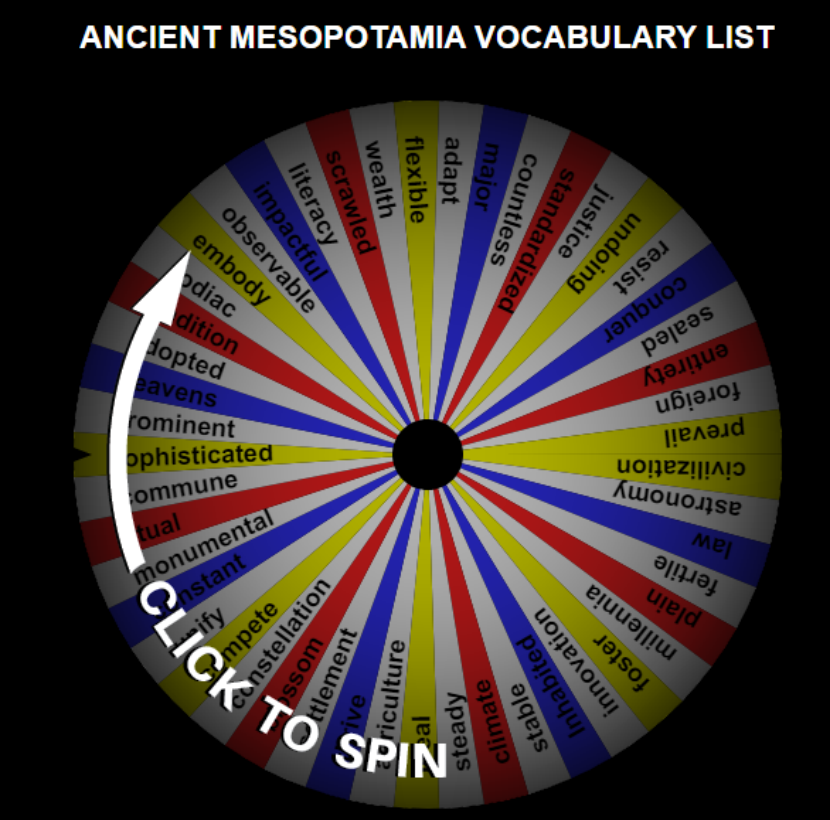
Link: https://wheeldecide.com/index.php?id=459326
Spin the wheel and get students to say a word. The first student who is able to do so gets a point for their team.
Paraphrasing
- “Mesopotamia is an exceedingly fertile plain situated between the Tigris and the Euphrates Rivers.”
- “Inhabited for nearly 12,000 years, Mesopotamia’s stable climate, rich soil and steady supply of fresh water made it ideal for agriculture to develop and thrive.”
- “Despite near constant warfare, innovation and development thrived in ancient Mesopotamia.”
- “But perhaps the most impactful innovation to come out of Mesopotamia is literacy.”

Using video in reading comprehension activities not only enhances students’ engagement but also aids in building critical language skills such as listening, vocabulary development, and contextual understanding. By incorporating multimedia into traditional reading lessons, teachers can cater to various learning styles and keep students motivated. We encourage you to try out this method and observe how it transforms reading into a more dynamic, interactive experience for your English learners.

DOWNLOAD THE PDF FOR FREE


